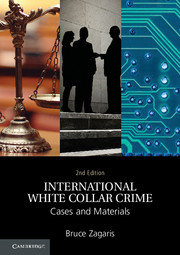Book contents
- Frontmatter
- Contents
- Preface
- 1 Introduction
- 2 Taxation
- 3 Money Laundering and Counterterrrorism Financial Enforcement
- 4 Transnational Corruption
- 5 Transnational Organized Crime
- 6 Export Control and Economic Sanctions
- 7 International Environmental Crimes
- 8 International Securities Enforcement
- 9 Extraterritorial Jurisdiction
- 10 International Evidence Gathering
- 11 Extradition and Alternatives
- 12 International Prisoner Transfer
- 13 The United Nations
- 14 The World Bank Group
- 15 INTERPOL
- 16 Economic Integration and Business Crimes
- Index
- References
14 - The World Bank Group
Published online by Cambridge University Press: 05 November 2015
- Frontmatter
- Contents
- Preface
- 1 Introduction
- 2 Taxation
- 3 Money Laundering and Counterterrrorism Financial Enforcement
- 4 Transnational Corruption
- 5 Transnational Organized Crime
- 6 Export Control and Economic Sanctions
- 7 International Environmental Crimes
- 8 International Securities Enforcement
- 9 Extraterritorial Jurisdiction
- 10 International Evidence Gathering
- 11 Extradition and Alternatives
- 12 International Prisoner Transfer
- 13 The United Nations
- 14 The World Bank Group
- 15 INTERPOL
- 16 Economic Integration and Business Crimes
- Index
- References
Summary
Overview and History
The World Bank Group (WBG) is an umbrella group of international financial institutions charged with promoting free market development to combat poverty. Established in 1944 during the famed Bretton Woods conference, the WBG includes two institutions – the International Bank for Reconstruction and Development (IBRD) and the International Development Association (IDA) – and three affiliated institutions: the International Finance Corporation (IFC), the Multilateral Investment Guarantee Agency, and the International Centre for Settlement of Investment Disputes (ICSID). Based in Washington, D.C., the WBG is run by a board of directors representing 185 stakeholder countries.
The World Bank Group (WBG) includes the International Monetary Fund (IMF), the World Bank (WB), and the other constituent entities. To fulfill its overall mission of fighting poverty, it helps countries strengthen development efforts by providing loans and technical assistance for institutional capacity building, as well as loans for infrastructure and environmental improvements. It provides resources, shares knowledge, and facilitates the development of partnerships in the public and private sectors.
The IMF's overall mission is macroeconomic and involves financial surveillance throughout the world. Through its activities, the IMF works to promote international monetary cooperation; facilitate the expansion and balanced growth of international trade; promote foreign currency exchange stability; and assist in the establishment of multilateral systems of payment. The IMF promotes international monetary stability by making loans to countries to allow them to correct maladjustments in their balance of payments without resorting to measures that may negatively affect national or international prosperity.
The IMF sets standards through its operational policies. For example, since the 1950s, it has attached conditions to loans made to states in need of economic assistance. These conditions allow recipients to obtain fund financing beyond the IMF member's Article IV commitment to meet their declared exchange rate parity with gold or the United States dollar referred to as the (automatic the “gold tranche”) if they implement economic and financial adjustment programs that the IMF considers satisfactory. In 1997, the IMF followed the World Bank and broadened these conditions to include general good governance. The IMF and World Bank have conditioned loans and projects on whether public policies are in place to avoid bribery, corruption, and fraudulent activity in the management of public resources.
- Type
- Chapter
- Information
- International White Collar CrimeCases and Materials, pp. 548 - 585Publisher: Cambridge University PressPrint publication year: 2015



